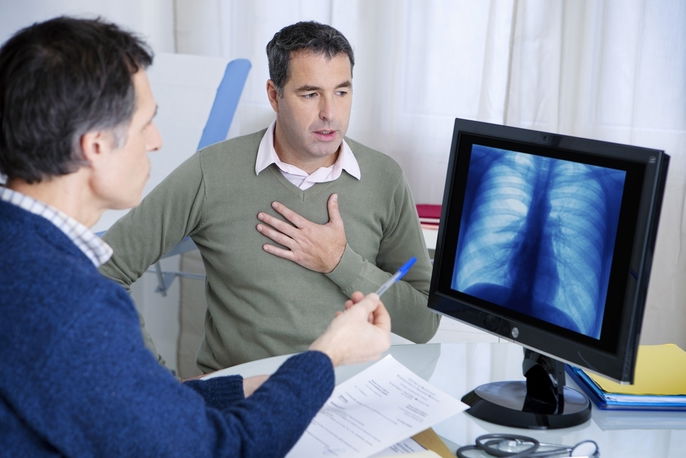Wheezing is usually a sign of a respiratory disease, like COPD, asthma or lung infection. It occurs with narrowing or inflammation of the airways that make air flow more difficult. This turbulent airflow through narrow airways makes a characteristic sound, known as wheezing.
Wheezing can also be a sign of a cardiac disease, as inadequate heart function can lead to fluid build-up in the lungs, making it hard for air to pass through the airways.
If you notice that wheezing is associated with a specific health condition, you should see a family doctor for assessment and diagnosis, so that treatment can be initiated as necessary.

What causes wheezing?
The most common causes of wheezing include:
1. Asthma
Asthma is a chronic inflammatory disease of the airways. It causes difficulty breathing that can be triggered by specific allergens, like fur or dust. It is one of the most common causes of wheezing and can occur with other symptoms, like shortness of breath, fatigue and chest tightness.
What to do: Asthma is not curable, but it can be managed with the right medications, like corticosteroids and bronchodilators. Treatment depend on each person’s health history, and should be directed by a lung specialist.
2. COPD
Chronic obstructive pulmonary disease, or COPD, is a disease that encompasses chronic bronchitis and/or emphysema, both which are frequent causes of wheezing.
This disease is associated with other symptoms like shortness of breath, coughing and difficulty breathing.
What to do: COPD treatment involves lifestyle changes, like smoking cessation. Treatment should be directed by a lung specialist, who will generally prescribe corticosteroids and bronchodilators.
3. Respiratory infections
Respiratory infections, like bronchitis, bronchiolitis or pneumonia can also cause wheezing. They can make breathing more difficult and lead to shortness of breath and increased phlegm. Learn more about the symptoms of lung infections and when to see a doctor.
What to do: Treatment for bacterial respiratory infections should be completed with antibiotics. If necessary, the doctor may also prescribe corticosteroids and bronchodilators to reduce inflammation and reduce work of breath.
Rest, hydration and healthy diet can also speed-up recovery.
4. Tobacco use or exposure
Using tobacco or being to it is a risk factor associated with respiratory diseases, like emphysema or chronic bronchitis. It can also worsen asthma, and increase airway inflammation that causes wheezing.
What to do: To avoid developing a lung disease or worsening an pre-existing condition, smoking cessation is highly advised.
5. Choking
Choking on food or accidentally inhaling a foreign body (which more commonly happens in children playing with small toys) can be very dangerous and can lead to airway obstruction.
The first signs of choking are difficulty breathing, coughing, and wheezing, although these can vary depending on where the food or object are lodged.
What to do: If you are unable to relieve choking promptly, or if you suspect a small object is lodged in the airways, you should seek medical attention immediately.
6. Cardiac problems
Having a cardiac problem, like heart failure, is another common cause of wheezing, especially in older adults. This occurs because the heart is unable to pump blood efficiently, leading to fluid accumulation in the lungs. This can cause tissue swelling, making it harder for air to enter and exit the lungs, which leads to wheezing.
Other common symptoms of cardiac problems include excessive fatigue, leg swelling, shortness of breath, and persistent dry cough. Learn more about symptoms of heart disease and when you should see a doctor.
What to do: Read more about the symptoms of heart disease you shouldn’t ignore. If you notice any of these symptoms, you should report them to your doctor for further assessment and possible treatment.
7. Sleep apnea
Sleep apnea is one of the main causes of wheezing during sleep, which can progress into snoring. This condition can also cause temporary stops in breathing, or make it more difficult to breathe when sleeping. It occurs to changes in the throat muscles that obstruct normal airflow.
In addition to noisy breathing when sleeping, sleep apnea can also lead to unrestful sleep and significant daytime fatigue.
What to do: Treatment for sleep apnea usually involves the use of a CPAP machine, although surgery many be necessary if the machine is not effective.
8. GERD
Gastroesophageal reflux disease (GERD) is characterized by the backflow of stomach content in the stomach up toward the mouth. The acid in this content can damage the upper airways and cause respiratory symptoms like hoarseness, coughing and wheezing. Check out what causes GERD and acid reflux, as well as other symptoms associated with it.
What to do: Treatment for GERD involves lifestyle changes and medications that help to protect the stomach and reduce acid production. Your doctor may also recommend a GERD diet that helps to soothe irritated stomach tissue and prevent further stomach acid production.






























